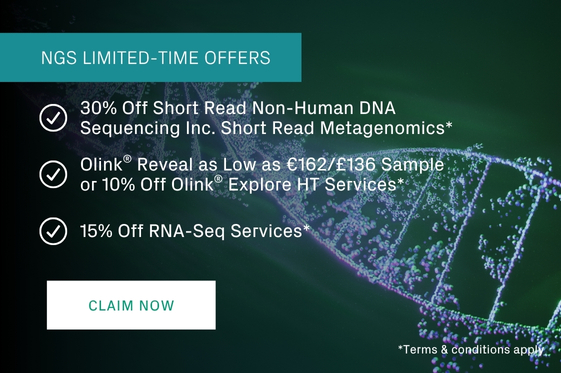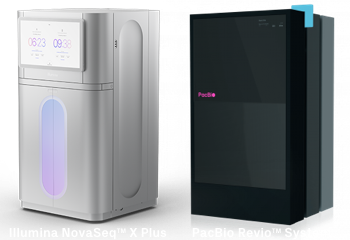Whole Genome Sequencing
Whole genome sequencing (WGS) provides unprecedented access to genomic information, accelerating breakthroughs in human healthcare, oncology, biomarker discovery, agriculture, and metagenomics.
Our whole genome sequencing services use cutting-edge technologies and bioinformatics to deliver high-quality data and analysis for your genome of interest. Whether you are studying human, animal, plant, bacteria, or virus species, we have a range of WGS services to cater to your unique research needs, no matter your desired read length or coverage.
What is whole genome sequencing and what is it used for?
Whole genome sequencing (WGS) is the comprehensive read and analysis of an entire genome, including non-coding regions of the genome.
WGS is used to facilitate discovery of novel genes and gene variants associated with disease. In the case of human WGS, researchers use WGS to explore gene expression and functional elements of the genome that help predict an individual’s response to drug therapies. WGS is also used to study the evolution of infectious pathogens and mechanisms of disease-causing mutation. Find the right NGS solution for your project using our interactive guide.
Features & Benefits
-
Superior Data QualityExceeding manufacturer’s benchmarks -
Fast TurnaroundStarting at 1 week for sequencing -
European ProviderSequencing available at our lab in Leipzig, Germany
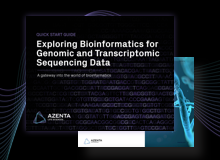
Quick Start Guide | Exploring Bioinformatics for Genome and Transcriptome Sequencing Data
For those new to bioinformatics, analyzing massive amounts of NGS data can be a daunting task. Download GENEWIZ’s bioinformatics quick start guide to learn how to analyze whole genome sequencing (WGS) and RNA sequencing (RNA-Seq) data with bioinformatics tools to reveal biological insights for your research.
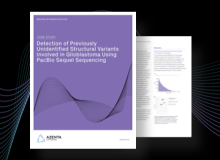
Case Study | Detection of Previously Unidentified Structural Variants Involved in Glioblastoma Using PacBio® Sequel® Sequencing
This case study looks at how GENEWIZ utilized the PacBio Sequel long-read technology to help a customer improve detection of structural variants within glioblastoma samples.
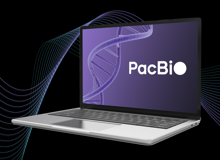
Webinar | A New Paradigm in DNA Sequencing – Highly Accurate Single-Molecule Long Reads (Hosted by PacBio)
In this PacBio-hosted webinar, Jonas Korlach, PacBio Chief Scientific Officer, and Dave Corney, GENEWIZ Associate Principal Scientist, Next Generation Sequencing, describe the recent release of Sequel System 6.0, which has revolutionized long-read sequencing by providing users the ability to generate highly accurate single-molecule reads.
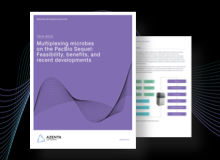

Best Practices | Preparation of High Molecular Weight DNA
High-quality high molecular weight (HMW) genomic DNA (≥50 kb) is critical to achieving long read lengths on platforms such as the 10x Genomics® Chromium™ and the PacBio Sequel. Follow these guidelines to generate the best possible WGS results.
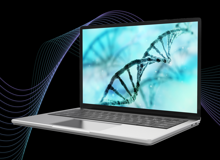
The $100 Genome: Using Low-Pass Whole Genome Sequencing as an Alternative to Genotyping Arrays
In this webinar originally presented at the ASHG 2020 Virtual Meeting, learn how low-pass WGS overcomes the inherent limitations and biases of traditional arrays, offering an inexpensive, high-throughput alternative for detecting genome-wide genetic variation and novel variants.
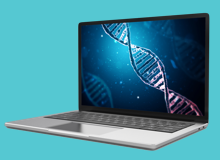
Workshop & Roundtable Discussion | Exploring Bioinformatics for Whole Genome Sequencing (WGS) Data
In this recording of our WGS bioinformatics workshop & roundtable discussion led by bioinformatics scientist Zain Alvi, Ph.D., we’ll guide you through the WGS bioinformatics process to help you learn to interpret WGS bioinformatics results, as well as address common challenges and answer frequently asked questions (FAQs).
NGS Platforms
GENEWIZ is a service provider of cutting-edge NGS platforms. For information on our NGS platforms and recommended configurations of your projects, please visit the NGS Platforms page. GENEWIZ from Azenta does not guarantee data output or quality for sequencing-only projects.





